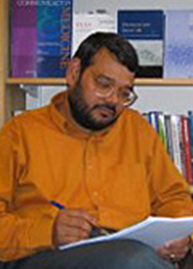The 2nd Winter School on Health Communication

Photo: courtesy of Alice Yau
If medicine is often considered in a mechanistic way where symptoms are signs of diseases calling for specific treatments, the importance of communication in clinical environments should not be overlooked. Indeed, countless interpersonal factors can influence what can be said, how it is said and understood in a medical setting. These factors include age, gender and cultures, but also the types of treatments and the environments where practitioners receive patients. On the 8th and 9th December 2012, The School of English of the University of Hong Kong was proud to host an important event co-organised by the SoE and the Centre for the Humanities and Medicine. The 2nd annual Winter School on Health Communication attracted language specialists and representatives of various medical disciplines willing to explore this complex subject.

Professor Srikant Sarangi
Photo: www.cardiff.ac.uk
This event was specifically targeted at professional practitioners, healthcare educators, as well as researchers and others engaged in the field of healthcare communication. The discussion was led by Professor Srikant Sarangi, Director of the Health Communication Research Centre at Cardiff University and expert in the field of Critical Discourse Analysis in medical contexts. Professor Sarangi is the author and editor of 10 books, 5 journal special issues and has published over 150 journal articles and book chapters. Professor Sarangi is also coordinator at the COMET society, an international society of scholars and professionals researching in the domain of communication, medicine and ethics.
The event was truly interdisciplinary with attendants coming from various professional backgrounds ranging from medicine practitioners to language specialists.
The first day’s lectures were rather theory-oriented, but accompanied with relevant examples and case analysis. Professor Sarangi lectured at the right rhythm with extreme clarity. At the end of the day, we left the room with the feeling of having learned and re-thought about a lot of interesting concepts, such as disease, illness, symptoms, etc. The second day focused on the application of these considerations to concrete situations such as patient-doctor interactions in the event of a diagnosis. This triggered stimulating discussions among the attendants and the diversity of backgrounds and fields of expertise offered all participants the chance to learn something new from each other while contributing in their own ways.
The winter School is likely to take place again next year in Hong Kong, and we are looking forward to having more young researchers, medical practitioners, and people with a general interest in health communication to join us !
Noel Christe & Cathy Zhang

Our apologies, you must be logged in to post a comment.